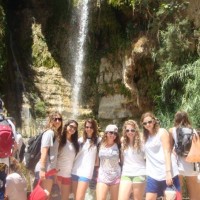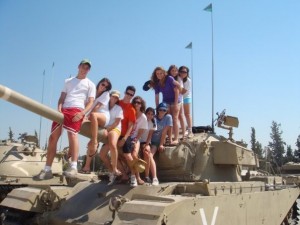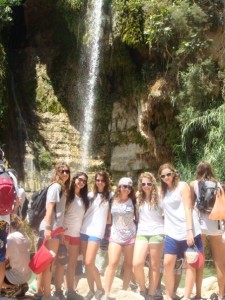
Ali Viterbi’s Reflection
[This is a transcript of a speech delivered on Yom Kippur 5769 by Ali Viterbi, a long-time Ramah California camper.]
On the top of a mountain in the most southern region of Israel, near Eilat, over forty 11th and 12th graders from the United States and Canada stood in awe, gaping at their surroundings. From the mountain’s peak, one could see the enormous sun rising over the Red Sea; its glow creating shimmering ripples in the calm water. The sight was breathtaking. After the usual round of “ooh’s,” “aah’s,” and pictures, the teenagers began chanting; what first began as a cowered murmur erupted into a loud roar. “Az Yashir,” the prayer from the Torah that we recite every morning in Shacharit, and which was sung by Miriam upon crossing the Red Sea, was suddenly being sung at full volume by the forty boys and girls in the same spot that Miriam herself sang those words. The moment was humbling. Together, the forty teenagers were united: In the viewing of such a breathtaking sight, in the overwhelming feeling of Jewish history, in their love of the State of Israel, and in the comfort of each other’s arms. Such scenes could honestly be found nearly every day on my past summer’s trip to Israel with Ramah Seminar. I have been going to Ramah Ojai since the age of nine. Therefore, to me, continuing my Ramah years and going to Israel with the same best friends that I had attended sleep-away camp with all my life was just the natural, inevitable step following my years as a camper. However, as the six weeks that I spent in Israel flew by, I realized that Seminar was, for me, so much more than just another year of Ramah. On Seminar, campers from all over North America came together to share in a remarkable experience.
Such scenes could honestly be found nearly every day on my past summer’s trip to Israel with Ramah Seminar. I have been going to Ramah Ojai since the age of nine. Therefore, to me, continuing my Ramah years and going to Israel with the same best friends that I had attended sleep-away camp with all my life was just the natural, inevitable step following my years as a camper. However, as the six weeks that I spent in Israel flew by, I realized that Seminar was, for me, so much more than just another year of Ramah. On Seminar, campers from all over North America came together to share in a remarkable experience.
Prior to this summer’s trip, I had gone to Israel with my family four times. I fell in love with the country on my first trip. Being there with my family and traveling around to all of the various holy, tourist sites was incredible. I couldn’t imagine a more rewarding trip. With every subsequent trip, I felt more like a native Israeli. However, after living there for six weeks, I consider my previous notions about the State of Israel extremely naive. I used to think that I knew everything there was to know about the land of Israel. Boy, was I wrong. Sure, I knew the superficial facts such as the date Herod built the city of Caesarea and how many museums there were in Jerusalem; but, I had no clue what Israeli society was actually like.
 Although on Seminar we also visited the million and a half tourist sites in Israel, I got so much more out of the experience than I had in any Israel trip I had been on. It is completely different traveling with your family to Israel than it is with your friends. When you’re on an organized trip with teenagers, so much more independence is granted to you than when you’re with your parents cooped up in hotel rooms. We stayed on two kibbutzim, we could freely walk down the street to the supermarket and make dinner, and we could even haggle with some shopkeepers. Though we were far from being “real Israelis,” I felt for the first time that Israel was my homeland too, and not just a tourist destination. Three out of four of my counselors were Israelis who had served in the army and could therefore share with us what it is like to actually live in the Jewish homeland. The fourth counselor was a veteran Ramahnik who had just spent her junior year studying at Hebrew University. Like us, she had fallen in love with the land. My counselors’ enthusiasm for the State of Israel, in addition to my first-hand experiences, enhanced my own love of Israel. I understand the significance of the land of Israel in our everyday lives as Jews and the importance of sustaining it as our homeland. I have already decided that as college application season approaches, one of my requirements for a school will be if they have a junior year abroad program in Israel. I just can’t wait to spend as much time in Israel as possible! Upon returning, I remember begging my Dad, “Please! When can we go back?”
Although on Seminar we also visited the million and a half tourist sites in Israel, I got so much more out of the experience than I had in any Israel trip I had been on. It is completely different traveling with your family to Israel than it is with your friends. When you’re on an organized trip with teenagers, so much more independence is granted to you than when you’re with your parents cooped up in hotel rooms. We stayed on two kibbutzim, we could freely walk down the street to the supermarket and make dinner, and we could even haggle with some shopkeepers. Though we were far from being “real Israelis,” I felt for the first time that Israel was my homeland too, and not just a tourist destination. Three out of four of my counselors were Israelis who had served in the army and could therefore share with us what it is like to actually live in the Jewish homeland. The fourth counselor was a veteran Ramahnik who had just spent her junior year studying at Hebrew University. Like us, she had fallen in love with the land. My counselors’ enthusiasm for the State of Israel, in addition to my first-hand experiences, enhanced my own love of Israel. I understand the significance of the land of Israel in our everyday lives as Jews and the importance of sustaining it as our homeland. I have already decided that as college application season approaches, one of my requirements for a school will be if they have a junior year abroad program in Israel. I just can’t wait to spend as much time in Israel as possible! Upon returning, I remember begging my Dad, “Please! When can we go back?”
One moment in particular that stood out from my trip to Israel was our first visit to the Kotel on our first Friday night in Jerusalem. After having Kabbalat Shabbat in a breathtaking viewpoint overlooking the Old City, we began our descent through the narrow corridors and on the Jerusalem cobblestone to the Kotel. Joining hands while walking, we sang the same familiar Ramah tunes that we had grown up singing. However, this time, something was different. This time, we were singing Hebrew prayers in the land of the Israelites. As we approached the wall so rich with Jewish history, tragedy, and joy, we were awe-struck. Many of the campers had never been to Israel before and began crying. Even I, who had been to the all a dozen times, felt my eyes filling with tears. It was this overwhelmingly powerful emotion that I felt being in Israel with my best friends at the site that so many Jews before me had gathered. What was most impressive for me was the walk back from the Kotel to our youth village. On a normal outing, the walk home would be filled with joking and laughing. But this time, everyone engaged in random, intellectual discussion about spirituality, God, and holiness. Hearing a variety of fascinating opinions has shaped my own beliefs about Judaism and spirituality. I believe that spirituality is not so inaccessible as I once previously believed. Rather, for me, spirituality can be epitomized by one particular sensation: the simultaneous feeling of being just one small speck in relation to the grand scheme of life and an overwhelming feeling of community and belonging to something greater than you. This is spirituality.
Be it at the Kotel, on top of a mountain overlooking the Red Sea, or simply here in shul with the same congregants with whom I have prayed with since I was born, I now feel spiritual. I have a greater sense of my Jewish community and the role that I play in regard to my people and Israel’s continuity. Undeniably, my trip on Ramah Seminar this summer has matured me.
